![]() In December 2021, Advance CTE and Education Strategy Group (ESG) convened the Credit for Prior Learning Shared Solutions Workgroup in service to the New Skills ready network sites. The work group was tasked with evaluating the policies and practices that enable credit for prior learning (CPL) to be implemented effectively within career pathways.
In December 2021, Advance CTE and Education Strategy Group (ESG) convened the Credit for Prior Learning Shared Solutions Workgroup in service to the New Skills ready network sites. The work group was tasked with evaluating the policies and practices that enable credit for prior learning (CPL) to be implemented effectively within career pathways.
This workgroup convened in service to the New Skills ready network sites, which are working to improve career pathways, expand real-world work experiences, improve transitions and close equity gaps. Evidence increasingly shows that CPL can boost learners’ completion rates in a way that saves them time and money.
A survey fielded by the Council for Adult and Experiential Learning (CAEL) and Western Interstate Commission on Higher Education (WICHE) found that adults who earned credit for prior learning were 17 percent more likely to complete a credential. Notably the impact was even greater for Hispanic learners, who experienced a 29 percent increase in credential completion, and Pell recipients, who are 19 percent more likely to complete a credential if they have earned CPL.
“Credit for Prior Learning is a crucial way for students to save time and money in pursuing a credential or degree,” says Georgia Reagan, strategy officer with Lumina Foundation. “However, students aren’t always aware of the opportunities available at their institutions. The Credit for Prior Learning in Career Pathways tool will be a valuable guide for higher education and policy leaders who want to create clear, accessible, and equitable processes that will help students in turning their prior learning experiences into invaluable college credits.”
To build more inclusive on-ramps to high quality postsecondary education, CPL processes should be expanded to reflect learners’ postsecondary-level learning gained through their life, educational and occupational experiences. This includes the common methods of assessing and awarding CPL, such as standardized examples, as well as work-based learning and industry-recognized credentials earned in high school, validated on-the-job training and non-credit, and non-degree coursework.
The workgroup designed a comprehensive Policy Benchmark Tool (PBT) to better support states, systems and institutions in embedding CPL in career pathways.
Getting Started
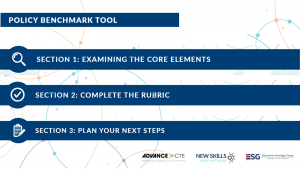 Effective use of the PBT requires intentional collaboration and planning. It is composed of three sections to enable users to: understand the core elements of strong CPL policy and practice, assess where their own policy and practice is strong and where opportunities remain, and create an action plan to improve the effective use of CPL in learners’ career pathways.
Effective use of the PBT requires intentional collaboration and planning. It is composed of three sections to enable users to: understand the core elements of strong CPL policy and practice, assess where their own policy and practice is strong and where opportunities remain, and create an action plan to improve the effective use of CPL in learners’ career pathways.
“With the recent decline in Indiana’s college-going rate, CPL opportunities will be critical to increasing the state’s postsecondary access, equity, and completion rates,” says Dawn Clark, Director of Academic Affairs and Transfer at the Indiana Commission for Higher Education. “As CPL awareness and opportunities continue to grow, consistent institutional policies and practices will help students earn credentials more quickly and affordably. The Credit for Prior Learning Policy Benchmark Tool could not have come at a better time!”
For optimal results, Advance CTE recommends that users:
- Compose a diverse team to complete the PBT’s self assessment rubric, including state agency staff, postsecondary system leaders, institutional practitioners, workforce development and industry partners and, most important, learners.
- Gather data and guiding documents to inform the self-assessment. Users may identify CPL participation and outcomes data, statewide or articulation agreements, approved credential lists, and institutional policy documents as potential supporting evidence.
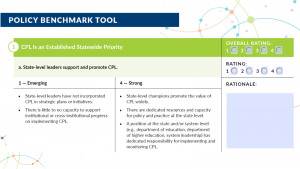
- Complete the self-assessment as a core team and gain an understanding of your ratings prior to soliciting additional input. Users may find that additional input is needed from learners, community-based organizations or employer partners, for example, to accurately rate how well CPL is understood and accessed as a career pathways strategy.
- Identify priority action areas to address first based on existing policy and practice, as well as other conditions in your state. There are always ways to improve CPL, and this tool illustrates the many areas a state, postsecondary education system or institution could focus on to improve the effectiveness of CPL.
Advance CTE staff are available to support CTE leaders in this important work. Please contact Candace Williams, Data & Research Manager, at cwilliams@careertech.org for more information about this initiative.
Candace Williams, Data and Research Manager



 Senate Appropriations Committee Releases FY23 Spending Proposals
Senate Appropriations Committee Releases FY23 Spending Proposals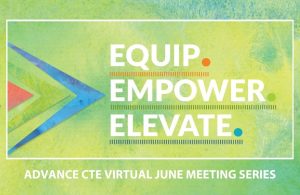 On June 8, Advance CTE held the first of three events that encompass our Virtual June Meeting Series. The series offers three opportunities to equip Career Technical Education (CTE) leaders with the latest research and innovations, empower them to succeed, and elevate their work to raise awareness of the value of CTE.
On June 8, Advance CTE held the first of three events that encompass our Virtual June Meeting Series. The series offers three opportunities to equip Career Technical Education (CTE) leaders with the latest research and innovations, empower them to succeed, and elevate their work to raise awareness of the value of CTE. 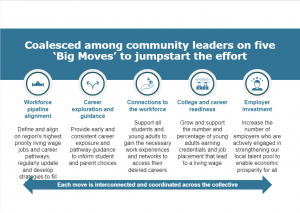 Dallas Foundation Chief Impact Officer Drexell Owusu was candid about the equity and quality of life challenges facing residents of Dallas. However, he was equally optimistic about the role that CTE can have in providing high-quality pathways to maximize recent economic growth and increase the number of young adults achieving a living wage to 50 percent within one generation. He identified five strategies that comprise the Dallas Thrives initiative to achieve this goal.
Dallas Foundation Chief Impact Officer Drexell Owusu was candid about the equity and quality of life challenges facing residents of Dallas. However, he was equally optimistic about the role that CTE can have in providing high-quality pathways to maximize recent economic growth and increase the number of young adults achieving a living wage to 50 percent within one generation. He identified five strategies that comprise the Dallas Thrives initiative to achieve this goal. 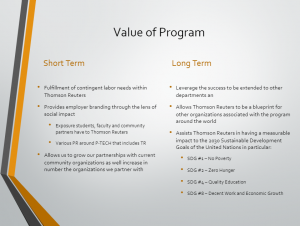 Thomson Reuters Director of Community Relations
Thomson Reuters Director of Community Relations 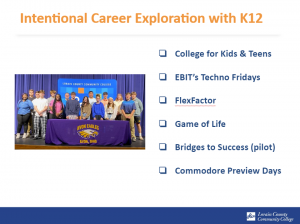 Lorain County Community College Manager of Career Technical Pathways & Programs
Lorain County Community College Manager of Career Technical Pathways & Programs 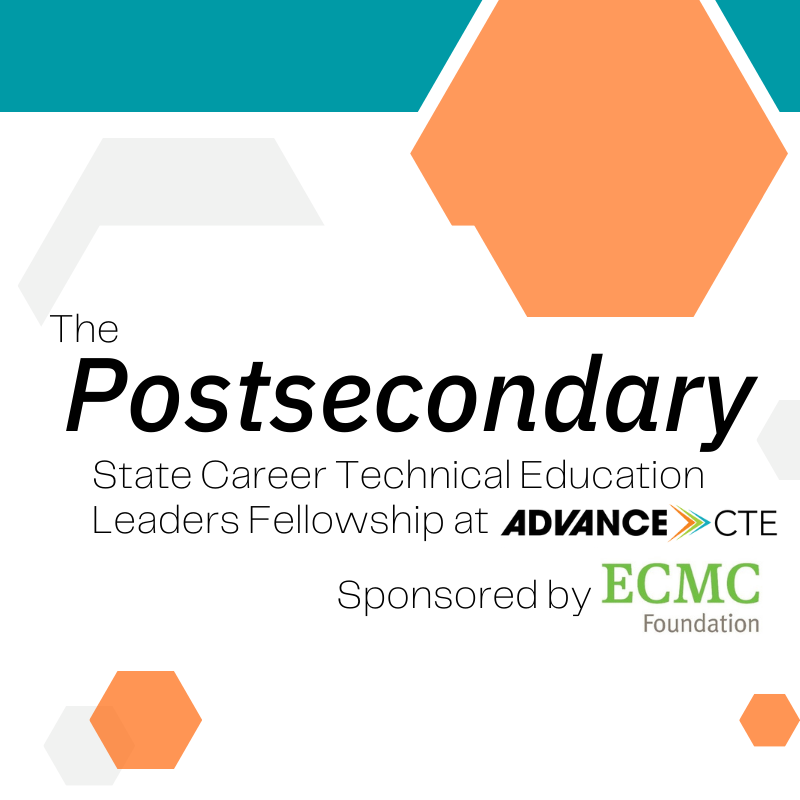 The Postsecondary State CTE Leaders Fellowship at Advance CTE – Sponsored by ECMC Foundation is intended to build a talent pipeline of state-level postsecondary Career Technical Education (CTE) leaders fiercely committed to creating an accessible and racially just postsecondary state CTE system. Through the
The Postsecondary State CTE Leaders Fellowship at Advance CTE – Sponsored by ECMC Foundation is intended to build a talent pipeline of state-level postsecondary Career Technical Education (CTE) leaders fiercely committed to creating an accessible and racially just postsecondary state CTE system. Through the 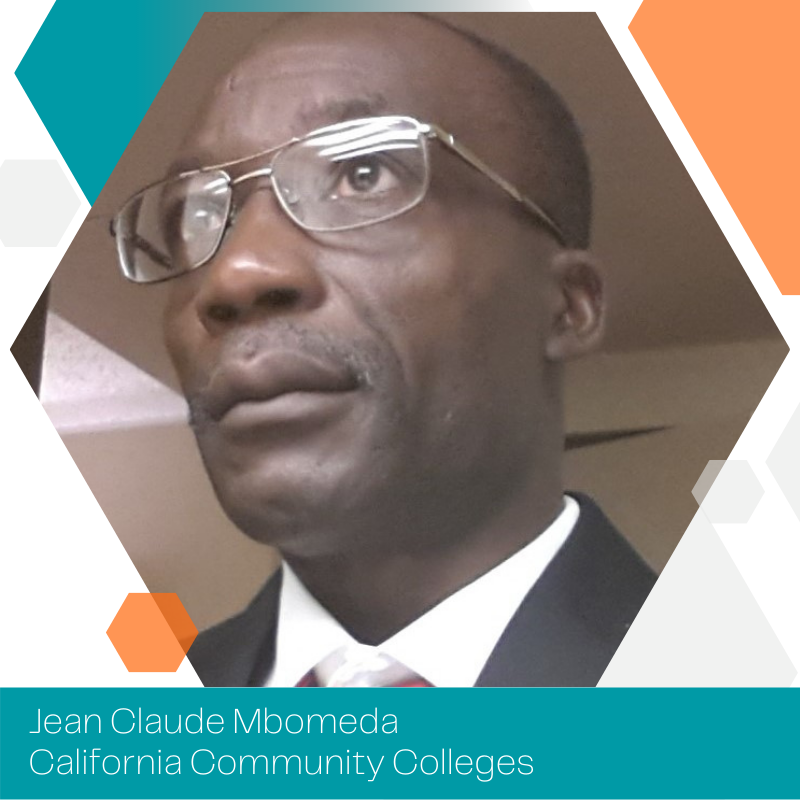
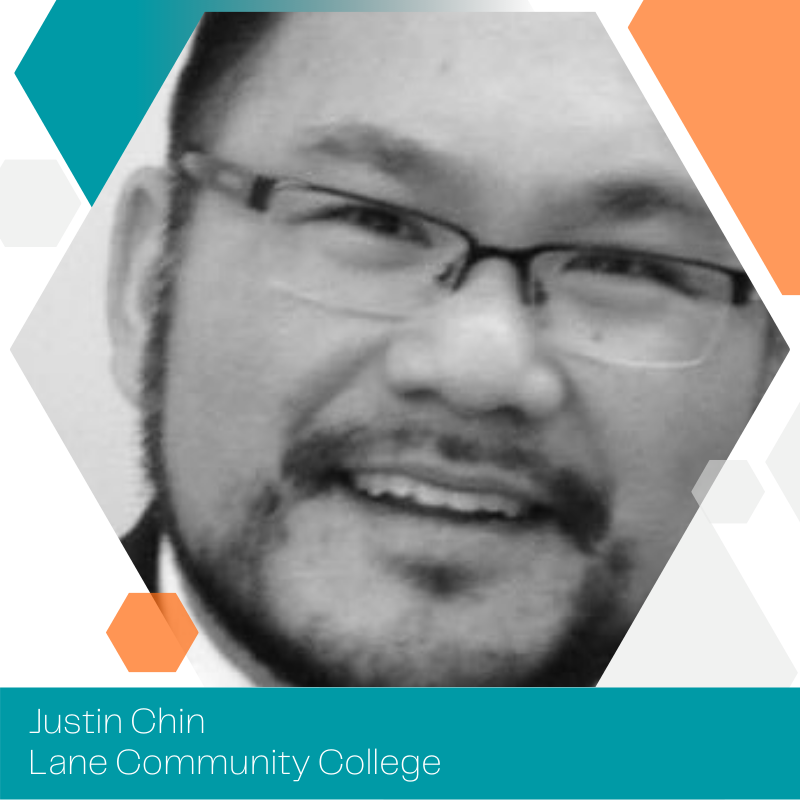 Justin Chin (Oregon) has two decades of experience in education as an instructor and student and career support specialist at the secondary and postsecondary level, and currently serves as Director of High School Connections at Lane Community College in Eugene, Oregon. He received a bachelor’s degree in English and master’s degree in Education from Western Oregon University. He is a current Governor’s appointee to the Eastern Oregon Regional Economic Recovery Council and serves as Vice Chair for Oregon Humanities.
Justin Chin (Oregon) has two decades of experience in education as an instructor and student and career support specialist at the secondary and postsecondary level, and currently serves as Director of High School Connections at Lane Community College in Eugene, Oregon. He received a bachelor’s degree in English and master’s degree in Education from Western Oregon University. He is a current Governor’s appointee to the Eastern Oregon Regional Economic Recovery Council and serves as Vice Chair for Oregon Humanities.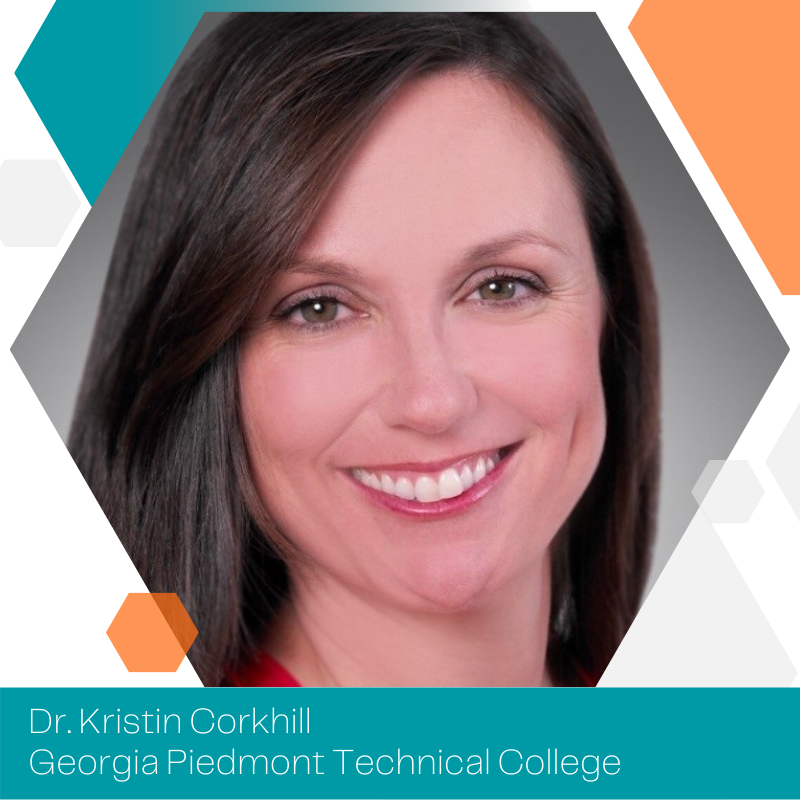 Dr. Kristin Corkhill (Georgia) has over a decade of program support and partnership experience in secondary and postsecondary education, and currently serves as Director of High School Initiatives at Georgia Piedmont Technical College. A dual-enrollment graduate, she earned a bachelor’s and master’s degree in History from the University of Florida and a doctorate in Leadership and Learning in Organizations from Vanderbilt University.
Dr. Kristin Corkhill (Georgia) has over a decade of program support and partnership experience in secondary and postsecondary education, and currently serves as Director of High School Initiatives at Georgia Piedmont Technical College. A dual-enrollment graduate, she earned a bachelor’s and master’s degree in History from the University of Florida and a doctorate in Leadership and Learning in Organizations from Vanderbilt University. Meet Nithya Govindasamy! Nithya is a Senior Advisor at Advance CTE; she recently joined the organization in October 2021. Nithya leads and manages major organization-wide, highly visible initiatives that support, promote and increase equitable access to and success in high-quality CTE, which includes: workforce development, education and equity initiatives; technical assistance (TA) for
Meet Nithya Govindasamy! Nithya is a Senior Advisor at Advance CTE; she recently joined the organization in October 2021. Nithya leads and manages major organization-wide, highly visible initiatives that support, promote and increase equitable access to and success in high-quality CTE, which includes: workforce development, education and equity initiatives; technical assistance (TA) for 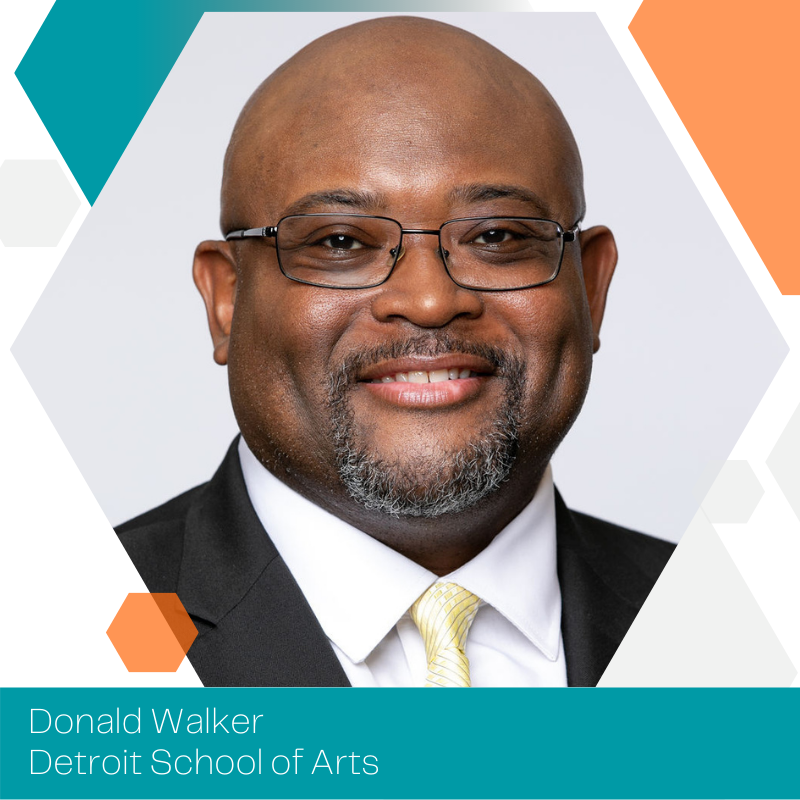 Donald Walker (Michigan)
Donald Walker (Michigan)  Heather Covington (North Carolina) began her CTE journey as a National Board Certified business and marketing instructor and career development coordinator, and currently serves as Assistant Principal at Alston Ridge Middle School in Cary, North Carolina. She is a first-generation graduate with bachelor’s and master’s degrees in Information Technology and Business Education from East Carolina University, an Education specialist degree from Old Dominion University, and two master’s degrees in Instructional Technology and School Administration from North Carolina State University and University of North Carolina, respectively.
Heather Covington (North Carolina) began her CTE journey as a National Board Certified business and marketing instructor and career development coordinator, and currently serves as Assistant Principal at Alston Ridge Middle School in Cary, North Carolina. She is a first-generation graduate with bachelor’s and master’s degrees in Information Technology and Business Education from East Carolina University, an Education specialist degree from Old Dominion University, and two master’s degrees in Instructional Technology and School Administration from North Carolina State University and University of North Carolina, respectively. 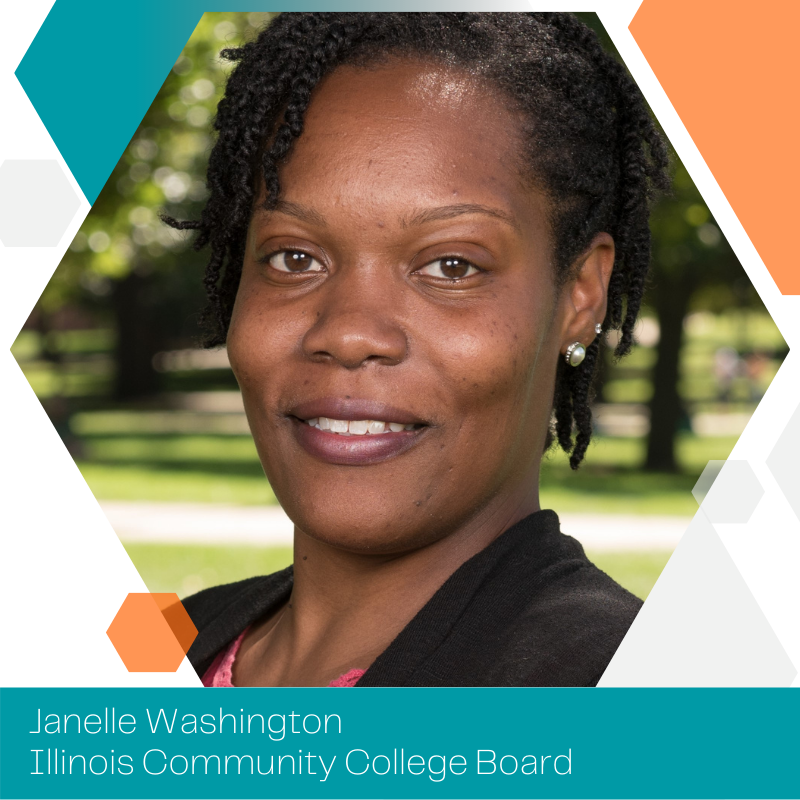 Janelle Washington (Illinois) previously held multiple positions in the criminal justice system prior to pursuing a career in higher education, and currently serves as a Director for Career and Technical Education at the Illinois Community College Board. She earned her bachelor’s degree in Criminal Justice from Southern Illinois University at Edwardsville and master’s degrees in Public Administration and College Student Personnel Administration from University of Illinois Springfield and Illinois State University, respectively.
Janelle Washington (Illinois) previously held multiple positions in the criminal justice system prior to pursuing a career in higher education, and currently serves as a Director for Career and Technical Education at the Illinois Community College Board. She earned her bachelor’s degree in Criminal Justice from Southern Illinois University at Edwardsville and master’s degrees in Public Administration and College Student Personnel Administration from University of Illinois Springfield and Illinois State University, respectively.